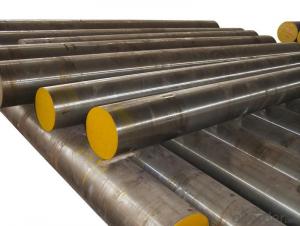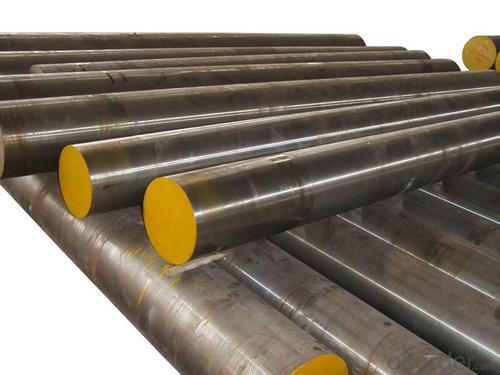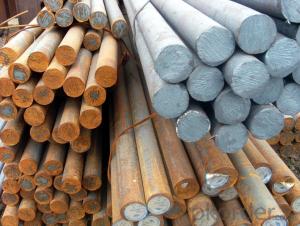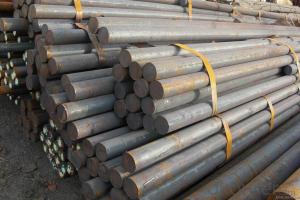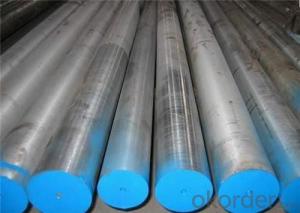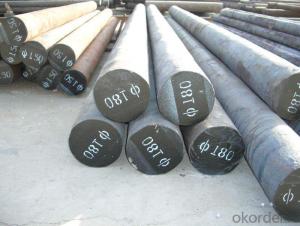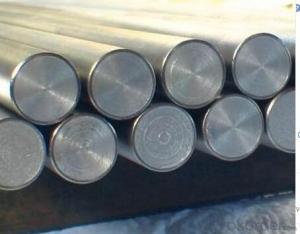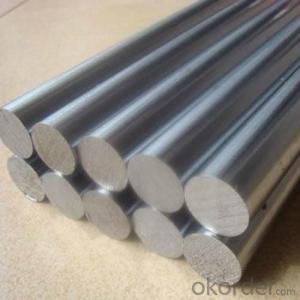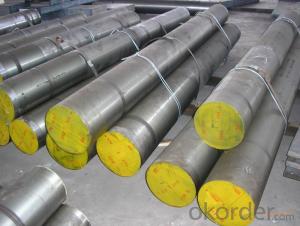Hot-rolled Round Bearing Steel GCr15,100Cr6,SAE 52100
- Loading Port:
- China main port
- Payment Terms:
- TT OR LC
- Min Order Qty:
- 500 m.t.
- Supply Capability:
- 10000 m.t./month
OKorder Service Pledge
OKorder Financial Service
You Might Also Like
Specifications of Hot-rolled Round Bearing Steel GCr15,100Cr6,SAE 52100
1) Grade: Bearing steel SAE 52100 / GCr15 round bars
2) Diameter: 20-500mm
3) Hot rolled/forged, annealed
Application of Hot-rolled Round Bearing Steel GCr15,100Cr6,SAE 52100:
Commom steel used to produce balls and rings of bearing. The product has characteristics of uniform-chemical composition, low percentage of harmful elements, high purity, well-distributed carbide, good surface quality. It also has characteristics of wide scope of plastic,stable heat-treatment quality, uniformand high hardness, high wear resistance,high strength of touching fatigue. It has excellent machining property afer spheroidize annealing.
The use of products The product is used to produce balls and rings of bearing. Future Development By rational rolling and cooling process, the product can be spheroidized on-line and can be used in drawing and machining directly by customers. By combining re-spheroidize annealing and re-crystallisation of semi-finished product, the steel wire process can be simplified.
Packaging & Delivery of Hot-rolled Round Bearing Steel GCr15,100Cr6,SAE 52100
Mark: Heat No. will be cold stamped and Steel grade, diameter (mm), length (mm), and the manufacturer LOGO and weight (kg) is painted.
Standard seaworthy packing or as customer required
Delivery time: Within 30 days after order is confirmed.
- Q: How does special steel contribute to the manufacturing of oil and gas equipment?
- Due to its unique properties and characteristics, special steel is essential in the manufacturing of oil and gas equipment. Its high strength and durability make it suitable for the demanding conditions of the industry. Equipment like drilling rigs, pipelines, and storage tanks face extreme pressures, corrosive environments, and harsh weather conditions. Special steel's superior mechanical properties allow it to withstand these conditions and ensure the equipment's reliable and long-lasting performance. Furthermore, special steel's resistance to corrosion and oxidation is highly beneficial in the oil and gas industry. Regular steel quickly deteriorates when exposed to corrosive substances and high temperatures. However, special steel is designed to resist corrosion, ensuring the equipment remains functional and safe over its lifetime. In addition, special steel's ability to withstand high temperatures and pressure differentials makes it suitable for heat exchangers and pressure vessels. These components are crucial in various oil and gas processes, including refining and transportation. Special steel's capability to handle extreme temperatures and pressures ensures the efficiency and safety of these operations. Moreover, special steel contributes to the manufacturing of oil and gas equipment by providing excellent weldability and machinability. This allows for easy fabrication and assembly, reducing production time and costs. The versatility of special steel empowers manufacturers to design and create complex equipment that meets the specific requirements of the oil and gas industry. In conclusion, special steel plays a crucial role in the manufacturing of oil and gas equipment. Its high strength, durability, corrosion resistance, and ability to withstand extreme temperatures and pressures make it an indispensable material in the industry. Special steel ensures the reliability, safety, and longevity of the equipment, making it an essential component in the oil and gas industry.
- Q: Can special steel be used for medical applications?
- Yes, special steel can be used for medical applications. It is often used for surgical instruments, implants, and medical devices due to its high strength, corrosion resistance, and biocompatibility.
- Q: How is special steel used in the construction supply chain?
- Special steel is used in the construction supply chain for various purposes, such as reinforcing concrete structures, manufacturing high-strength bolts and fasteners, producing heavy machinery and equipment, and fabricating durable and corrosion-resistant components. Its unique properties, including high strength, toughness, and resistance to wear and tear, make it an essential material in the construction industry, ensuring the safety, reliability, and longevity of structures and infrastructure projects.
- Q: What are the different types of corrosion-resistant steel?
- There are several types of corrosion-resistant steel, including stainless steel, weathering steel, and galvanized steel. Stainless steel is the most common type, known for its high resistance to corrosion due to the presence of chromium. Weathering steel forms a protective rust-like layer, providing long-term corrosion resistance. Galvanized steel is coated with a layer of zinc, which acts as a barrier against corrosion.
- Q: What are the different types of free-cutting steel?
- The different types of free-cutting steel include leaded free-cutting steel, sulfurized free-cutting steel, and resulfurized and rephosphorized free-cutting steel.
- Q: What are the main applications of special steel in the semiconductor industry?
- Special steel is widely used in the semiconductor industry for various applications. One of the main applications is in the manufacturing of wafer handling components such as vacuum chucks, reticle stages, and load ports. Special steel's high strength, corrosion resistance, and precision machining capabilities make it ideal for these critical components that require excellent dimensional stability and reliability. Additionally, special steel is also used in the construction of cleanroom equipment, such as gas cabinets, exhaust systems, and process tools, where its resistance to chemical and thermal stress is highly valued. Overall, special steel plays a crucial role in ensuring the efficiency, accuracy, and safety of semiconductor manufacturing processes.
- Q: What are the different methods of machining special steel?
- There are several different methods of machining special steel, each with its own advantages and applications. Some of the most common methods include: 1. Turning: Turning is a machining process that involves rotating a workpiece while a cutting tool removes material from the surface. This method is typically used to create cylindrical shapes and can produce high-quality finishes. 2. Milling: Milling is a versatile machining method that uses rotary cutters to remove material from a workpiece. It can be used to create complex shapes and contours, and is often employed in the production of special steel components. 3. Drilling: Drilling is a machining process that involves creating holes in a workpiece using a rotating cutting tool. It can be used to create both through holes and blind holes in special steel, and is commonly used in various industries. 4. Grinding: Grinding is a precision machining method that uses an abrasive wheel to remove material from a workpiece's surface. It is often used to achieve tight tolerances and smooth finishes on special steel components. 5. Broaching: Broaching is a machining process that uses a sharp cutting tool with multiple teeth to remove material in a series of linear cuts. It is commonly used to create keyways, splines, and other intricate shapes in special steel. 6. Electrical Discharge Machining (EDM): EDM is a non-traditional machining method that uses electrical discharges to remove material from a workpiece. It is particularly useful for machining special steel with complex shapes or for creating small features. 7. Laser Cutting: Laser cutting utilizes a high-powered laser to cut through special steel with extreme precision. It is commonly used for intricate designs and can produce smooth edges without the need for subsequent processing. Each of these methods has its own advantages and limitations, and the choice of machining method depends on factors such as the desired outcome, the complexity of the part, and the properties of the special steel being machined.
- Q: How does special steel perform in terms of wear resistance?
- Special steel is known for its exceptional wear resistance, making it highly durable and long-lasting even under harsh conditions. It exhibits superior resistance to abrasion, erosion, and impact, allowing it to withstand heavy usage and minimize wear and tear. This characteristic makes special steel an excellent choice for applications where wear resistance is crucial, such as in the manufacturing of tools, machinery, and automotive components.
- Q: How is corrosion-resistant steel different from regular steel?
- Corrosion-resistant steel, also known as stainless steel, is different from regular steel because it contains a higher proportion of chromium and other alloying elements. These elements form a protective layer on the surface of the steel, preventing it from rusting or corroding when exposed to moisture or aggressive environments. Regular steel, on the other hand, lacks this protective layer and is more prone to rust and corrosion.
- Q: Can special steel be used in the medical industry?
- Yes, special steel can be used in the medical industry. It is commonly employed in the production of surgical instruments, medical implants, and equipment due to its high strength, corrosion resistance, and biocompatibility. Special steel alloys, such as stainless steel and titanium alloys, are extensively utilized in various medical applications to ensure patient safety and enhance the effectiveness of medical procedures.
Send your message to us
Hot-rolled Round Bearing Steel GCr15,100Cr6,SAE 52100
- Loading Port:
- China main port
- Payment Terms:
- TT OR LC
- Min Order Qty:
- 500 m.t.
- Supply Capability:
- 10000 m.t./month
OKorder Service Pledge
OKorder Financial Service
Similar products
Hot products
Hot Searches
Related keywords
